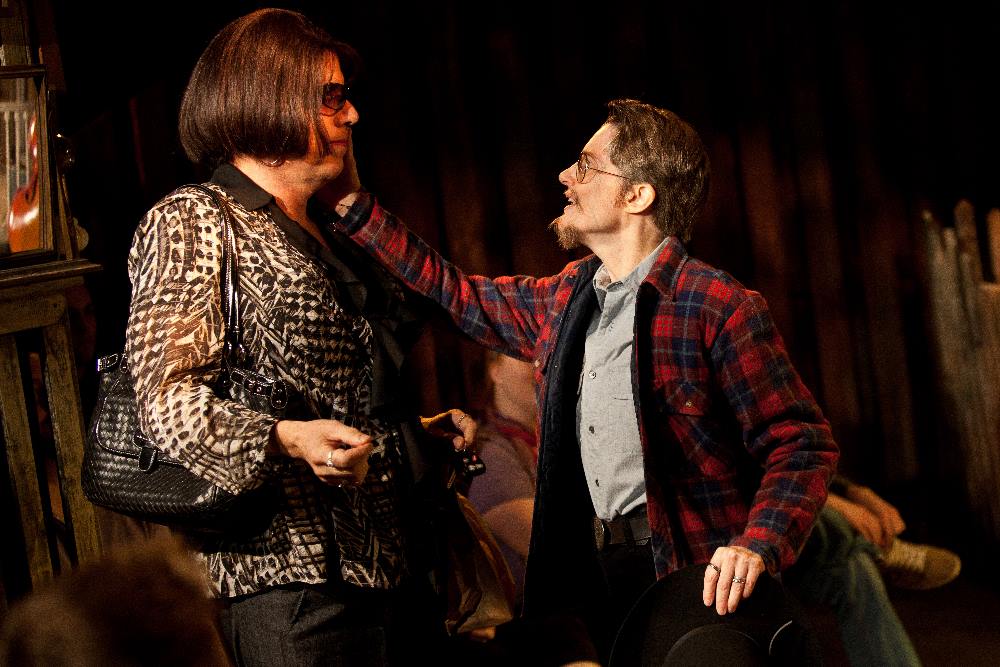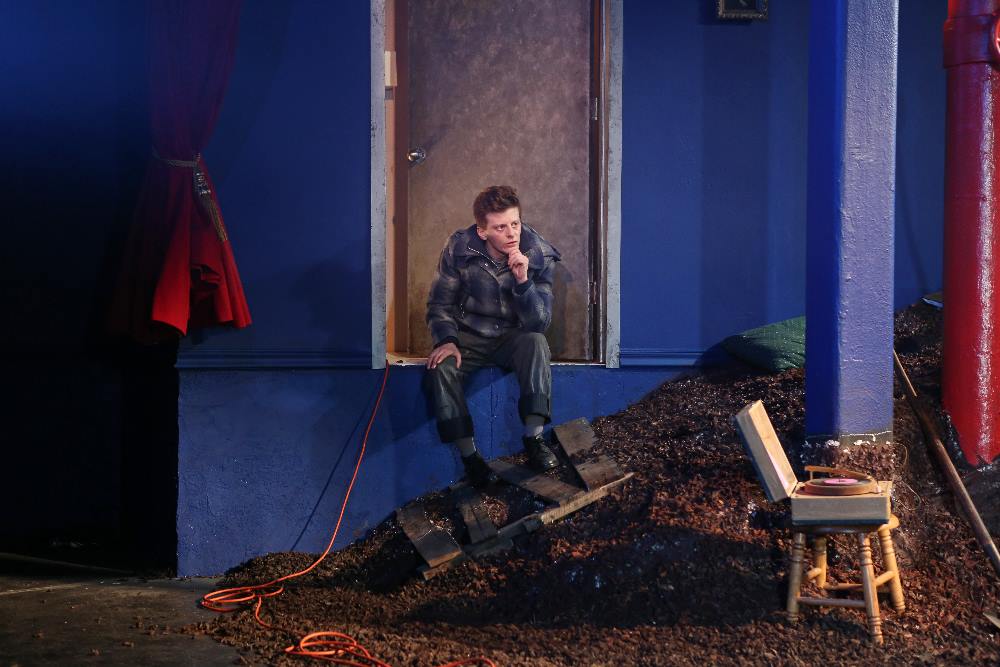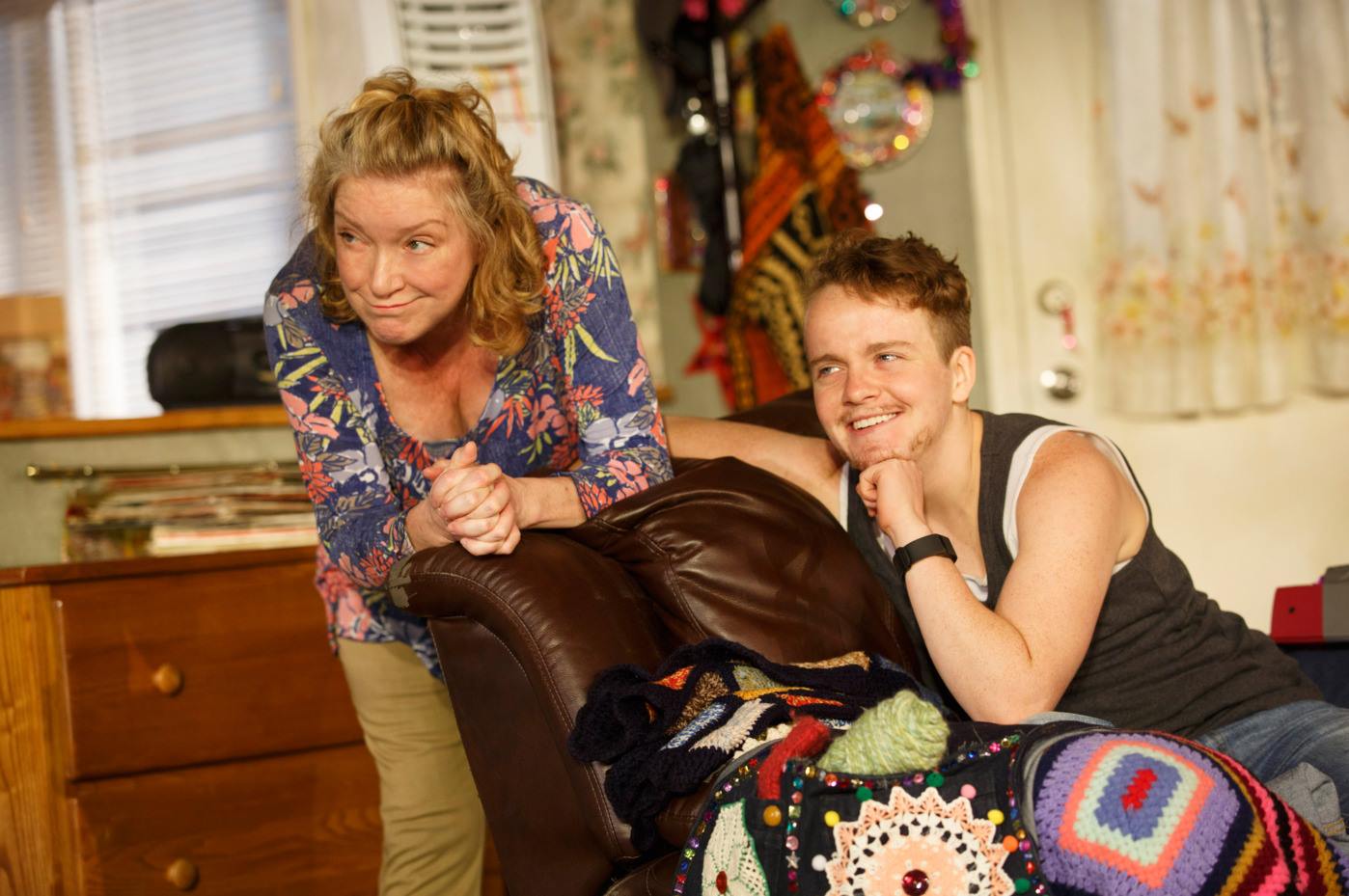NEW YORK CITY: In the world of entertainment, it’s currently trendy to be transgender. On television, the trans* experience is given prominent placement in “Transparent” and “Orange Is the New Black.” In film, Eddie Redmayne has been nominated for a bevy of awards for playing a transgender woman in The Danish Girl. And in New York theatre this season, trans* characters have been leads in a variety of productions, from Hir to Southern Comfort.
“I look down at my hands and I’m like, ‘Six months ago, this [body] was not cool,’” joked trans* performer, Becca Blackwell, over the phone. For an idea of just how hot it is to be trans* right now, just look at Blackwell’s recent performance schedule. When we spoke, they (Blackwell’s preferred pronoun) were in the middle of A Ride on the Irish Cream at Abrons Arts Center, which runs through Feb. 6, in which they played a pontoon boat/horse who was in love with a young girl, opposite their real-life partner, Erin Markey. Later this month at the same venue, Blackwell will be performing their one-person autobiographical show They, Themself, and Schmerm (Feb. 25–28).
Of course, for trans* people—a broad category encompassing not only transgender people but a variety of genderqueer and gender-non-conforming identifications—this isn’t a pop-culture trend; it’s their life. And it’s not new to the stage; queer and trans* performance has a long history in cabarets, clubs, and experimental ensembles. But this season, trans* characters are coming in from the fringe and showing up Off-Broadway, in Hir by Taylor Mac at Playwrights Horizons last fall; O, Earth by Casey Llewellyn, presented and commissioned by the Foundry Theatre at HERE (Jan. 23–Feb. 20); and Southern Comfort at the Public Theater, a musical composed by Julianne Wick Davis, with book and lyrics by Dan Collins (Feb. 23–March 27).
Blackwell admitted that five shows in one season (including theirs) feels like progress. “There’s more because there was like none,” they said. “If you’re not part of the straight white world, and you’re slowly seeing [yourself] kind of reflected or shown, any crumb, you think: This crumb is a meal. Because you’ve never had a meal.”
But as when any “outsider” experience goes mainstream, there’s cause for both celebration and caution, as these productions pose numerous questions about how America’s increasingly visible trans* population is represented in the popular culture, and about the kinds of artists who are telling the stories and playing the roles.
Like the trans* experience itself, these plays vary widely in their approach. Hir has a female-to-male transgender young man whose family is in flux; Irish Cream is a metaphor for an adult queer relationship in all of its mundane minutiae; O, Earth features a transgender young man who wants to get married; and Southern Comfort—the most high-profile of these productions—follows a female-to-male transgender man diagnosed with ovarian cancer.
Strikingly, in many of these cases, trans* characters are played by trans* actors—a departure from the well established practice in film and TV of casting cisgender actors as trans* characters (“Transparent,” Transamerica, The Danish Girl), which Southern Comfort also largely follows. It’s too soon to know if the present increase in trans* stories and characters is leading to a substantial demand for trans* performers, but actor Jess Barbagallo—who stars in O, Earth—said he’s seeing a small change. “Increasingly, I get emails all the time asking me to work on a new project that’s being made for no money, but that’s dealing with trans* issues or feature a trans* character, or people asking me, ‘Who do you know?’ That’s happening a lot right now.”
Still, he admitted having mixed feelings about the mainstreaming of trans* representation. “I’m not suddenly excited that I might work more because trans* is like ‘interesting’ right now,” he said. “In fact, that sort of repulses me. It’s like I’ve been doing something and being in my body for a really long time. And I’m just really worried about the commodification of any identity.”
O, Earth, a queer reimagining of Thornton Wilder’s Our Town, also features such characters as high-profile lesbian couple Ellen DeGeneres and Portia de Rossi, Wilder himself, and trans* activist pioneers Marsha P. Johnson and Sylvia Rivera. Barbagallo plays George, a character from Our Town who, in O, Earth, is a transgender man.
It was important to the creators of O, Earth to go the extra mile to find the performers who could fill the roles. “I talked to people at Global Action Project, Audre Lord Project, Red Umbrella Project, at Anti-Violence Project,” said O, Earth playwright Casey Llewellyn. “And I reached out to a lot of queer theatre people and queer theatremakers of color.” Barbagallo was a little easier to find: He and Llewellyn have known each other since 2009.
Though the performers are most certainly there, it can sometimes take an extra effort to find them. When Playwrights Horizons held an open Equity Principal audition for Hir, looking for a young transgender male performer, only one person showed up. But Mac was adamant that the role of Max—a teenaged transgender man whose mother upends the house when their father suffers a stroke—be cast authentically. So Playwrights casting directors Alaine Alldaffer and associate Lisa Donadio took to Facebook and reached out to LGBTQ organizations.
And then there was the issue with the casting breakdown. Backstage originally had no non-binary option when selecting the gender of a character. Following that original Equity audition, a social media campaign by both Mac and Playwrights Horizons led to changes at the publication. Users can now identify themselves as transgender (in all its configurations) or as “unspecified,” and casting agents can now search for (and tag breakdowns with) transgender or “unspecified” options.
“The controversy that happened with Backstage also created this huge conversation,” Alldaffer said. “We had people who would weigh in who would say, ‘I’m a transgender actor,’ and I would say, ‘Who are you? I will see you for this!'”
Though it took longer than normal, and was more labor-intensive, the team was ultimately able to bring in 25 actors to read for the part of Max, eventually casting 18-year-old Tom Phelan. Hir received strong reviews and ended up extending twice, playing two-and-a-half months at Playwrights. For the theatre it was a valuable exercise in flexibility and not being dependent on the traditional casting routes; it also expanded their acting pool. Said Donadio, “It’s opened doors for us that we didn’t know were there, other avenues to finding actors. It was definitely helpful.”

For many producers of stories about trans* experiences, it’s not so simple as finding the narrative and presenting it. In December, the Public Theater announced that after a nationwide casting call (an atypical move), it had found two transgender actors for Southern Comfort, out of 130 submissions. The musical, based on the real-life story of a transgender man, Robert Eads, who died of ovarian cancer after being unable to find doctors willing to treat him, has been in development since 2007, and previously ran at Barrington Stage. From the beginning it has featured Annette O’Toole, a cisgender woman, in the role of Eads. The two trans* actors cast for the Public are in smaller supporting roles.
While the story is a touchstone for the trans* community, this casting news didn’t sit well with trans* performer Taylor Edelhart. Southern Comfort features five trans* characters, three played by cisgender actors (those whose gender at birth matches their personal gender identity), and the entire creative team is cisgender. Notably, though, trans* artist and HowlRound cofounder Polly Carl is the production’s dramaturg.
Edelhart released an open letter, reading in part, “Every day, trans people the world over are told that their identities are not real, are invalid, are just a show. But our identities are not negotiable, and our collective ability to tell stories based in trans experiences and history shouldn’t be either. Why would the Public further fuel this damaging notion that trans people aren’t competent enough to tell their own community’s stories?”
The letter, released just before the holidays, garnered more than 300 signatures. When asked why they wrote the letter, Edelhart said that it was from “seeing an institution as large as the Public do casting that’s unjust. Like really, really blatantly unjust.”
Though the artists from Southern Comfort were not available for this story, other individuals we talked to said that this is not a simple matter of partitioning—that actors can only play characters who are like themselves. It’s an issue of equality and access. For performers like Blackwell, not conforming to a gender binary—especially in an industry that tends to box its actors into types even within genders—has made it more difficult to find work. “I couldn’t just go through Backstage and be like the funny friend of the lead, 20s, 30s—I wasn’t female enough or male enough for those roles,” they said.
Because trans* actors have a disproportionately tougher time finding work, then, giving a transgender role to a cisgender actor seems especially unfair. The Danish Girl is just another role in Eddie Redmayne’s long résumé, but it could have been a breakout moment for an unknown transgender actor. Likewise Maura on “Transparent,” or Eads in Southern Comfort.
For his part, Barbagallo has played men, and individuals whose genders are not defined, in his career. And he doesn’t see a contradiction in insisting on the one hand “that trans people should be able to play cis parts,” while firmly stating, “No, I don’t think cis people should be playing trans roles right now.” He considers it a form of affirmative action, a way to level a playing field that, in its current iteration, still prioritizes white, cisgender, able-bodied actors. “It’s like looking at people who are disenfranchised and claiming that we’re all even-steven. I kind of think that’s bullshit—a really silly blot over history. Art is supposed to change the world, and our actions can do that via these representations.”

This isn’t a case for shutting down opportunities, but for considering implications. Said Llewellyn, who is cisgender, “Everyone’s allowed to do whatever they want to do. But it’s just like, what impact do your actions have? What are you doing and what is going to happen as a result of it?”
Llewellyn knew that if she wrote about the trans* experience, she would need a cast who could make sure the representation of their community was authentic. It’s a mindset she hopes that other artists adopt if they choose to tackle the topic.
“Why write trans* characters if trans* people are not going to have anything to do with that or benefit in any way from that, either financially or in terms of the conversation that’s going on?” she posited. “I feel like cis people should not be defining the terms of conversation around trans-ness or how that gets represented.”
For Southern Comfort, the creative team and the Public wanted to keep most of the original cast intact, since a majority of those actors had been involved since early workshops. But the theatre has taken steps to make its facilities more welcoming to individuals on all points of the gender spectrum: Actors’ costumes are no longer labeled as “Mr.” or “Miss,” front-of-house staff will be trained to avoid gendered language (the pre-show speech will not contain the phrase, “Ladies and gentlemen”), and bathrooms will be fixed with signs that open them up to non-gender-conforming individuals.
They’ve also partnered on the production with the Gender and Family Project at the Ackerman Institute. There will also be a number of post-show talkbacks with LGBTQ organizations and artists and, in response to Edelhart’s letter, a public town hall on March 7.
“We are in a learning place too,” said Shanta Thake, who heads the Public’s in-house diversity committee (she’s also the director of Joe’s Pub). “We’re not coming into this conversation thinking we have all the answers, nor are we just going to do Southern Comfort and that’s the end of it. We really want this to be a starting place. And I think it will lead to a series of really positive conversations around all ideas of representation, and things that we do differently.”

According to a study released by the Human Rights Campaign, 2015 was the deadliest year for trans* individuals, with 21 homicides; a majority of the victims were transgender women of color. And due to lack of support and higher rates of abuse, trans* individuals have a higher risk of suicide, according to the American Foundation for Suicide Prevention and the Williams Institute. So for many trans* performers, authentic representation isn’t an academic issue; it’s life-or-death.
“If the existence of those representations can mean less violence toward the most vulnerable members of my community, I’m like, Fuck yes,” Barbagallo said. “If it can engender a sense of empathy in people who might never have conceived of gender as like a fluid, flexible, growing thing, then yeah—I want to feel hopeful about that.”
For Edelhart, the next step should be to foster the development of trans* and genderqueer generative artists, who are still predominantly toiling in the fringes. Edelhart has been in contact with the Public ever since the open letter, and they have many suggestions for how the institution can move forward, including “a show in their next two seasons, created, cast, staffed entirely by trans* people. There are lots of us, many of whom signed the letter with their professional designations.”
For their part, Blackwell is already feeling signs of change. They were recently approached for the role of a husband in Happily Ever After by Laura Zlatos. “The casting [breakdown] of it was ‘man or masculine person,’” Blackwell recalled. The show, about a couple whose child is born with both male and female genitals, runs March 30–April 16 at 59E59.
Though Blackwell couldn’t do the part, they commended the breakdown. It made clear that the part “could be played by a cis or trans* man, just someone that was just masculine—I thought that was actually really smart. Is this actor good and is this actor connecting with this other actor or actress? The person being trans* or straight has nothing to do with the story. It’s just about a story. And all we are are meat carcasses.”


